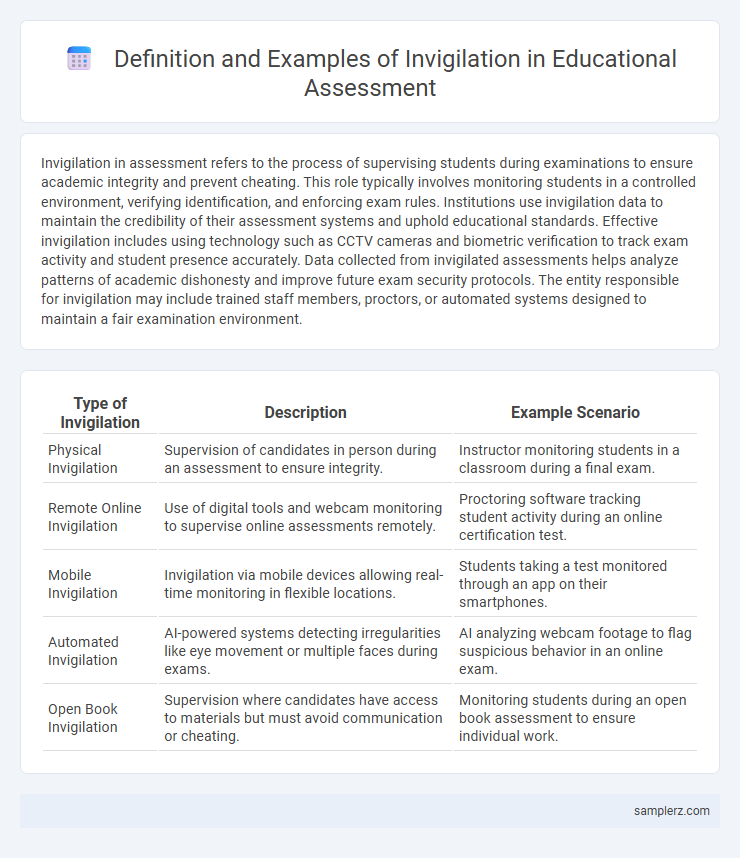Invigilation in assessment refers to the process of supervising students during examinations to ensure academic integrity and prevent cheating. This role typically involves monitoring students in a controlled environment, verifying identification, and enforcing exam rules. Institutions use invigilation data to maintain the credibility of their assessment systems and uphold educational standards. Effective invigilation includes using technology such as CCTV cameras and biometric verification to track exam activity and student presence accurately. Data collected from invigilated assessments helps analyze patterns of academic dishonesty and improve future exam security protocols. The entity responsible for invigilation may include trained staff members, proctors, or automated systems designed to maintain a fair examination environment.
Table of Comparison
| Type of Invigilation | Description | Example Scenario |
|---|---|---|
| Physical Invigilation | Supervision of candidates in person during an assessment to ensure integrity. | Instructor monitoring students in a classroom during a final exam. |
| Remote Online Invigilation | Use of digital tools and webcam monitoring to supervise online assessments remotely. | Proctoring software tracking student activity during an online certification test. |
| Mobile Invigilation | Invigilation via mobile devices allowing real-time monitoring in flexible locations. | Students taking a test monitored through an app on their smartphones. |
| Automated Invigilation | AI-powered systems detecting irregularities like eye movement or multiple faces during exams. | AI analyzing webcam footage to flag suspicious behavior in an online exam. |
| Open Book Invigilation | Supervision where candidates have access to materials but must avoid communication or cheating. | Monitoring students during an open book assessment to ensure individual work. |
Understanding Invigilation: Definition and Importance
Invigilation in assessment refers to the process of supervising students during examinations to ensure academic integrity and prevent cheating. Effective invigilation maintains a fair testing environment, safeguarding the credibility of examination results. Trained invigilators monitor seating arrangements, verify student identities, and enforce examination rules to uphold assessment standards.
Common Invigilation Practices in Schools
Common invigilation practices in schools include continuous supervision of students during exams to prevent cheating, verifying student identification before the assessment begins, and ensuring a quiet, controlled environment to maintain exam integrity. Invigilators often rotate seating arrangements and monitor time strictly to uphold fairness. These procedures help schools maintain standardized testing conditions and reliable assessment results.
Roles and Responsibilities of Invigilators
Invigilators monitor examination environments to ensure academic integrity by preventing cheating and maintaining proper conduct. Responsibilities include verifying candidate identities, distributing exam materials accurately, and promptly addressing any irregularities or disruptions during assessments. They must also adhere to institutional policies and report any suspicious behavior to preserve the fairness and validity of the examination process.
Digital Invigilation: Online Exam Monitoring
Digital invigilation in assessment employs advanced AI-driven online exam monitoring systems to ensure academic integrity by detecting suspicious behaviors such as unauthorized device usage or gaze deviation. These platforms utilize real-time video analysis, keystroke tracking, and browser lockdown features to prevent cheating during remote examinations. Implementation of digital invigilation enhances fairness and reliability in online assessments while enabling scalable and flexible exam administration.
Invigilation During Standardized Testing
Invigilation during standardized testing involves supervising students to ensure test integrity and prevent cheating. Trained invigilators monitor exam rooms, verify student identities, and enforce time limits to maintain a fair assessment environment. Effective invigilation supports accurate measurement of student performance and upholds the validity of standardized test results.
Real-World Invigilation Scenarios
During university final exams, invigilation involves proctors monitoring students in exam halls to prevent cheating and ensure adherence to exam rules. In online assessments, real-time video surveillance and screen-sharing software are used to verify student identity and maintain academic integrity. Workplace certification tests often employ remote invigilation platforms that use AI to detect suspicious behavior or unauthorized resources.
Technology Tools for Efficient Invigilation
Technology tools for efficient invigilation include AI-powered proctoring software that monitors students through webcams and microphones during online assessments, detecting suspicious behavior using real-time analytics. Secure browser applications restrict access to unauthorized resources and prevent screen sharing or copy-pasting, ensuring academic integrity. Biometric verification methods, such as facial recognition and fingerprint scanning, authenticate student identities to eliminate impersonation risks during examinations.
Ethical Guidelines for Invigilators
Invigilators must strictly adhere to ethical guidelines by maintaining confidentiality and impartiality throughout the assessment process. They are responsible for preventing cheating by closely monitoring candidates and ensuring a distraction-free environment. Clear communication of rules and consistent enforcement upholds the integrity and fairness of educational assessments.
Addressing Challenges in Invigilation
Addressing challenges in invigilation during assessments involves implementing robust identification verification methods and utilizing advanced surveillance technology to prevent cheating. Training invigilators to recognize suspicious behavior and ensuring clear communication of exam rules enhances the integrity of the process. Utilizing software for real-time monitoring and data analysis helps detect anomalies and maintain a fair testing environment.
Impact of Effective Invigilation on Assessment Integrity
Effective invigilation ensures strict adherence to examination protocols, minimizing opportunities for cheating and safeguarding the fairness of assessments. Rigorous monitoring during exams helps maintain the credibility of academic results by preventing unauthorized access to exam materials. Consequently, consistent invigilation practices contribute to upholding institutional reputation and student confidence in the evaluation process.

example of invigilation in assessment Infographic
 samplerz.com
samplerz.com